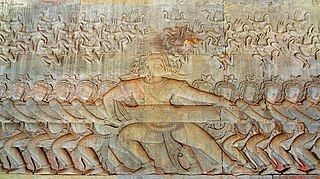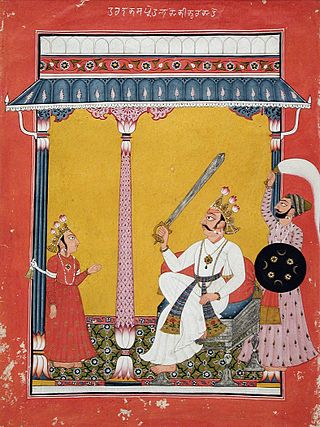Hiranya ("gold" in Sanskrit) may refer to:
Hiranya ("gold" in Sanskrit) may refer to:

Asuras are a class of beings in Indian religions. They are described as power-seeking beings related to the more benevolent Devas in Hinduism. In its Buddhist context, the word is translated as "titan" or "antigod".

Prajapati is a Vedic deity of Hinduism and he is a form of Brahma, the creator god.

Hiranyakashipu, also known as Hiranyakashyap, was a daitya king of the asuras in the Puranas.

The cosmic egg, world egg or mundane egg is a mythological motif found in the cosmogonies of many cultures and civilizations, including in Proto-Indo-European mythology. Typically, there is an egg which, upon "hatching", either gives rise to the universe itself or gives rise to a primordial being who, in turn, creates the universe. The egg is sometimes lain on the primordial waters of the Earth. Typically, the upper half of the egg, or its outer shell, becomes the heaven (firmament) and the lower half, or the inner yolk, becomes the Earth. The motif likely stems from simple elements of an egg, including its ability to offer nourishment and give rise to new life, as is reflected by the Latin proverb omne vivum ex ovo.
Deva may refer to:
Hindu cosmology is the description of the universe and its states of matter, cycles within time, physical structure, and effects on living entities according to Hindu texts. Hindu cosmology is also intertwined with the idea of a creator who allows the world to exist and take shape.

Holika, also known as Simhika, is an asuri in Hinduism. She is the sister of the asura-kings Hiranyakashipu and Hiranyaksha, and the paternal aunt of Prahlada.

Hiranyagarbha is the source of the creation of the universe or the manifested cosmos in Vedic philosophy. It finds mention in one hymn of the Rigveda, known as the Hiraṇyagarbha Sūkta, suggesting a single creator deity, identified in the hymn as Prajāpati. The concept of the "golden womb" is first mentioned in the Vishvakarma Sūkta which picturized the "primeval womb" as being rested set upon the navel of Vishvakarman. This imagery was later transferred to Vishnu and Surya.
Svayambhu is a Sanskrit word that means "self-born", "self-manifested", "self-existing", or "that that is created by its own accord". Various deities and entities featured in Hindu literature and tradition are regarded to be svayambhu, such as Brahman in the Upanishads, and the Trimurti of Brahma, Vishnu, and Shiva, and Manu in the Puranas.
The tenth mandala, or chapter, of the Rigveda contains 191 hymns. Together with Mandala 1, it forms the latest part of the Rigveda, containing material, including the Purusha Sukta (10.90) and the dialogue of Sarama with the Panis (10.108), and notably containing several dialogue hymns.
The Asuras are a race of power-seeking deities in Hinduism.
Ravan, Raavan or Ravanan, may refer to:
Rambha may refer to:
Murari is an epithet of the Hindu deity Krishna, referring to his act of slaying the asura, Mura.
Peiris, Peries or Pieris is a surname attributed to the Sinhalese people of Sri Lanka. It is a common surname in the coastal regions of the island nation.
Golden Temple, also known as the Harmandir Sahib, is a Sikh temple (gurdwara) and the holiest Sikh site in Amritsar, India.

Tulabhara, also known as Tula-purusha or Tula-dana, is an ancient Hindu practice in which a person is weighed against a commodity, and the equivalent weight of that commodity is offered as donation. The Tulabhara is mentioned as one of the sixteen great gifts in the ancient texts, and is performed in several parts of India.

The sixteen great gifts refers to a category of ritual donations mentioned in the Puranic texts of ancient India.
Hiranyagarbha is an ancient Indian ritual ceremony involving the donation of a golden vessel. It is mentioned as one of the "Sixteen great gifts" in the historical texts.

Manaku of Guler or Manaku was an Indian painter from the Guler State, in modern-day Himachal Pradesh. After his death he was mostly forgotten and overshadowed by his much-celebrated younger brother Nainsukh. But today he is recognised as an exponent of Pahari style of painting, much like his brother. The rediscovery of Manaku has been a result of research efforts by art historians like B. N. Goswamy. Like Nainsukh, Manaku almost never signed his works, and only four extant works carry his signature.